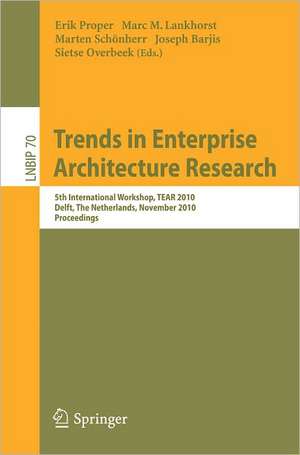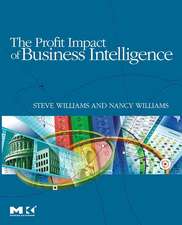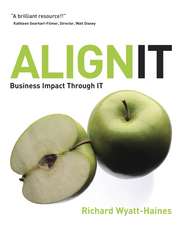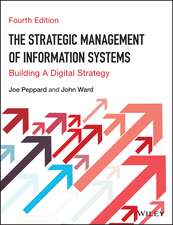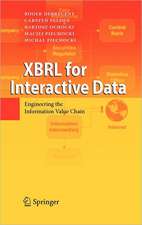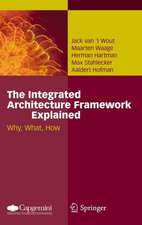Trends in Enterprise Architecture Research: 5th Workshop, TEAR 2010, Delft, The Netherlands, November 12, 2010, Proceedings: Lecture Notes in Business Information Processing, cartea 70
Editat de Marc Lankhorst, Marten Schönherr, Joseph Barjis, Sietse Overbeeken Limba Engleză Paperback – 29 oct 2010
The 7 papers presented were extensively reviewed and selected from 15 submissions. They report on core concepts and the effectiveness of enterprise architecture, on architecture description languages, and on exemplary case studies.
Din seria Lecture Notes in Business Information Processing
- 20%
 Preț: 327.95 lei
Preț: 327.95 lei - 20%
 Preț: 328.79 lei
Preț: 328.79 lei -
 Preț: 285.94 lei
Preț: 285.94 lei - 20%
 Preț: 415.80 lei
Preț: 415.80 lei -
 Preț: 378.12 lei
Preț: 378.12 lei -
 Preț: 391.61 lei
Preț: 391.61 lei - 20%
 Preț: 323.80 lei
Preț: 323.80 lei - 20%
 Preț: 332.89 lei
Preț: 332.89 lei - 20%
 Preț: 341.15 lei
Preț: 341.15 lei -
 Preț: 392.60 lei
Preț: 392.60 lei -
 Preț: 383.93 lei
Preț: 383.93 lei - 20%
 Preț: 332.89 lei
Preț: 332.89 lei -
 Preț: 381.98 lei
Preț: 381.98 lei -
 Preț: 383.93 lei
Preț: 383.93 lei -
 Preț: 385.62 lei
Preț: 385.62 lei - 20%
 Preț: 328.09 lei
Preț: 328.09 lei -
 Preț: 387.38 lei
Preț: 387.38 lei -
 Preț: 384.86 lei
Preț: 384.86 lei -
 Preț: 384.86 lei
Preț: 384.86 lei -
 Preț: 387.75 lei
Preț: 387.75 lei -
 Preț: 379.09 lei
Preț: 379.09 lei -
 Preț: 384.86 lei
Preț: 384.86 lei -
 Preț: 486.42 lei
Preț: 486.42 lei - 20%
 Preț: 411.66 lei
Preț: 411.66 lei -
 Preț: 391.61 lei
Preț: 391.61 lei -
 Preț: 392.37 lei
Preț: 392.37 lei -
 Preț: 483.55 lei
Preț: 483.55 lei - 20%
 Preț: 340.64 lei
Preț: 340.64 lei -
 Preț: 383.93 lei
Preț: 383.93 lei - 20%
 Preț: 346.24 lei
Preț: 346.24 lei -
 Preț: 398.35 lei
Preț: 398.35 lei -
 Preț: 394.51 lei
Preț: 394.51 lei - 20%
 Preț: 330.90 lei
Preț: 330.90 lei -
 Preț: 384.48 lei
Preț: 384.48 lei - 20%
 Preț: 418.27 lei
Preț: 418.27 lei -
 Preț: 486.42 lei
Preț: 486.42 lei -
 Preț: 399.29 lei
Preț: 399.29 lei -
 Preț: 481.58 lei
Preț: 481.58 lei - 20%
 Preț: 338.68 lei
Preț: 338.68 lei -
 Preț: 479.67 lei
Preț: 479.67 lei - 20%
 Preț: 328.79 lei
Preț: 328.79 lei - 20%
 Preț: 352.67 lei
Preț: 352.67 lei -
 Preț: 399.29 lei
Preț: 399.29 lei -
 Preț: 391.61 lei
Preț: 391.61 lei - 20%
 Preț: 419.10 lei
Preț: 419.10 lei - 20%
 Preț: 328.79 lei
Preț: 328.79 lei -
 Preț: 391.61 lei
Preț: 391.61 lei - 20%
 Preț: 297.00 lei
Preț: 297.00 lei
Preț: 377.95 lei
Nou
Puncte Express: 567
Preț estimativ în valută:
72.33€ • 75.08$ • 60.31£
72.33€ • 75.08$ • 60.31£
Carte disponibilă
Livrare economică 03-17 martie
Preluare comenzi: 021 569.72.76
Specificații
ISBN-13: 9783642168185
ISBN-10: 3642168183
Pagini: 101
Ilustrații: IX, 101 p. 25 illus.
Greutate: 0.18 kg
Ediția:2010
Editura: Springer Berlin, Heidelberg
Colecția Springer
Seria Lecture Notes in Business Information Processing
Locul publicării:Berlin, Heidelberg, Germany
ISBN-10: 3642168183
Pagini: 101
Ilustrații: IX, 101 p. 25 illus.
Greutate: 0.18 kg
Ediția:2010
Editura: Springer Berlin, Heidelberg
Colecția Springer
Seria Lecture Notes in Business Information Processing
Locul publicării:Berlin, Heidelberg, Germany
Public țintă
ResearchCuprins
The Contribution of Enterprise Architecture to the Achievement of Organizational Goals: A Review of the Evidence.- Trends in Enterprise Architecture Practice – A Survey.- An Enterprise-Wide Intervention at IRS: A Longitudinal Analysis of Stakeholder Sentiments.- A Conceptual Framework for Enterprise Architecture Design.- The Roles of Principles in Enterprise Architecture.- Leveraging Software Architectures through the ISO/IEC 42010 Standard: A Feasibility Study.- Integrating Standard Platforms in Heterogeneous IT Landscapes through Service-Oriented EAM.
